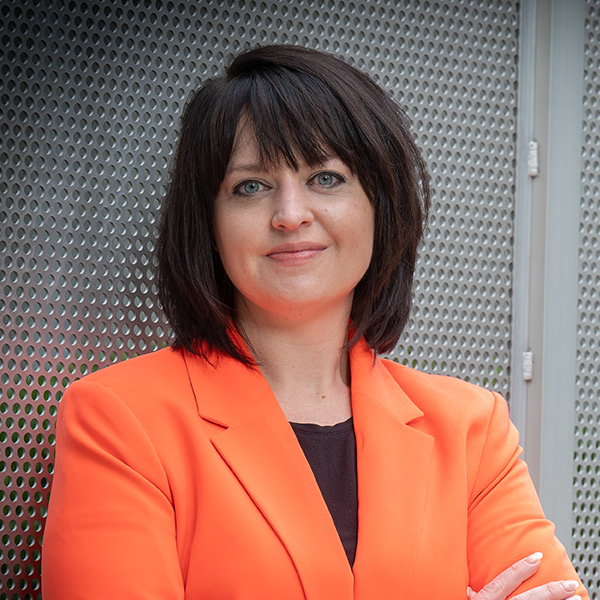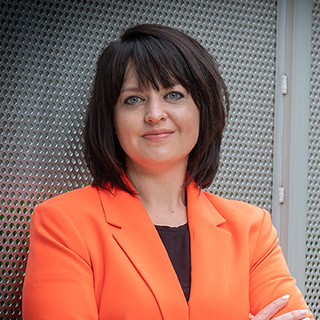
As director of the USW TMC, Fitch encourages workers to support safe and healthy workplaces. “Unions give people a much-needed voice on the job and an opportunity to improve their working conditions,” she said. (Photo courtesy of Ashlee Fitch)
For Ashlee Fitch, promoting workers’ rights and safety runs in the blood. Raised in a close-knit community in West Virginia, Fitch looks up to more than three generations of relatives who served as union members, including her paternal grandfather.
“My grandfather has always been my role model,” Fitch said. “As a veteran and union worker, he taught me the importance of being open and fair to all.”
Those lessons continue to inspire Fitch, who serves as director of the United Steelworkers (USW) Tony Mazzocchi Center (TMC)), the primary training division for the Steelworkers Charitable and Educational Organization.
A network of several nonprofit organizations, the USW TMC delivers health and safety training to workers in various chemical, industrial, pharmaceutical, and manufacturing industries. With funding and support from the NIEHS Worker Training Program (WTP), the USW TMC serves communities across the U.S., Puerto Rico, Guam, and the Virgin Islands.
Career Shift: From Reactive to Proactive Focus
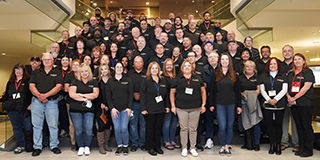
“USW TMC staff truly believe in the mission of our organization and are constantly working to improve access to and increase the quality of training for workers. Without them, and our trainers, we would not be able to make such a difference,” said Fitch, pictured with staff and trainers. (Photo courtesy of Ashlee Fitch)
After earning a bachelor’s degree from West Virginia University (WVU), Fitch started working at the same aluminum manufacturing facility from which her grandfather had retired. As she learned to operate various machines, she also grew to understand the pivotal role of labor unions in ensuring safer working conditions.
Later, after graduating from WVU’s master’s program in safety, Fitch became an intern with the USW International’s Health, Safety, and Environment Department, assisting USW members in resolving health and safety issues across the U.S. Her work often included responding to life-altering injuries and fatalities that occurred at represented workplaces.
“Every year, thousands of workers lose their lives on the job,” Fitch said. “It is especially tragic when there are recognized controls that could have prevented these incidents. One of the most effective tools we can employ is high-quality training. I’m proud to be able to serve as director of the USW TMC and help workers get the resources they need to do their jobs safely.”
Training at DOE Sites
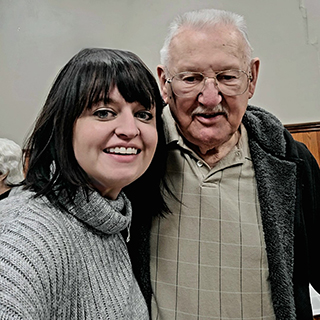
“I always encourage people to think about communities and workplaces as intertwined, and to think about what types of interventions would be effective across the board. If we have good working conditions, then we have a stronger community, which leads to an increased economic impact and more,” said Fitch, pictured with her grandfather. (Photo courtesy of Ashlee Fitch)
As a WTP grant recipient, the USW TMC’s health and safety training covers a wide range of topics, including hazardous materials, emergency response, infectious diseases, and more. This training empowers workers with the skills and knowledge needed to raise or address safety concerns on their job sites, Fitch explained.
One of USW TMC's prime training areas involves sites operated by the U.S. Department of Energy (DOE). Funding from the NIEHS/DOE Nuclear Worker Training Program enables USW TMC to develop curricula for workers dealing with hazardous materials within DOE nuclear weapons complexes.
For example, the USW TMC offers specialized training for radiological control technicians at gaseous diffusion plants in Portsmouth, Ohio, and Paducah, Kentucky. These technicians are charged with ensuring all workers on site are safe from radiological hazards. During the seven-month training program, participants learn about topics like sources of radiation, biological effects of radiation exposure, and radioactive incidents and emergencies.
The training has been an incredible success, Fitch noted.
“With this program, we have a unique opportunity to help educate and enhance the livelihood of workers and communities near DOE sites. Having well trained radiological control technicians protects everyone – workers and communities alike,” Fitch said. “The program is a great model of collaboration between agencies and organizations to make sites safer and create economic impact in the community, all while promoting DOE’s mission.”
Enhancing Disaster Preparedness and Response
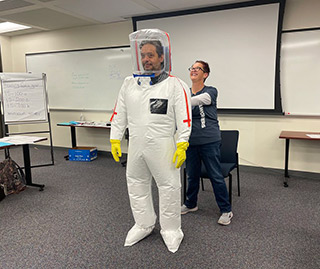
Members of the SERTs team demonstrate the importance of proper techniques to put on and use personal protective equipment at an enhancement training in Pittsburgh, Pennsylvania. (Photo courtesy of Ashlee Fitch)
When hurricanes, earthquakes, or other major disasters strike, the USW TMC deploys a team of specialized emergency response trainers (SERTs) who collectively provide on-the-spot training for workers and communities in the affected areas. These efforts are funded by the NIEHS HazMat Disaster Preparedness Training Program, part of WTP.
SERTs from unions and worker centers help deliver health and safety training on topics like personal protective equipment, debris cleanup, mold remediation, and more. Their efforts were critical during the aftermath of Hurricanes Ian, Irma, Maria, and Harvey, when they trained workers to safely clean up damaged homes and buildings. The SERTs have shifted their focus from exclusively responding to disasters to actively engaging local unions and community groups in preparedness activities to decrease the impact any disaster may have.
“The SERTs team embodies one of the founding principles of the USW TMC – unity,” Fitch said. “Team members have different work and life experiences and use those experiences to help all impacted communities.”
Promoting Recovery Friendly Workplaces
Use of prescription opioids and other substances is common in industries where workers are prone to physical injuries or stressful situations.
“Work-related ergonomic injuries have long been recognized as a leading cause of non-fatal accidents in various industries. These injuries can lead to musculoskeletal disorders – which can lead to pain management through medication,” Fitch explained.
In recent years, Fitch and her colleagues have noticed an increase in substance use among the worker populations they serve, particularly in high-risk industries like manufacturing.
Unfortunately, many employers do not recognize substance use as a disorder. Some operate on a zero-tolerance policy, penalizing or terminating workers coping with substance use rather than offering them support through treatment and recovery. But employers should instead recognize the role of the workplace in leading to substance use, according to Fitch.
“To really address the source of the problem, facilities need to address ergonomic hazards in the workplace,” she said. “Aside from that, workers who suffer from substance use disorders need recovery programs that support them – not dissociate them.”
The USW TMC promotes recovery friendly workplace programs, which offer supportive spaces for workers recovering from substance use and help ease their workplace reentry. By providing training for workers and their families, USW TMC raises awareness about substance use and mental health and highlights resources available for union members. For instance, the USW’s Emergency Response Team is available to provide member and family support for those who are in recovery or grieving after losing loved ones.
Recruiting the Next Generation of Workers
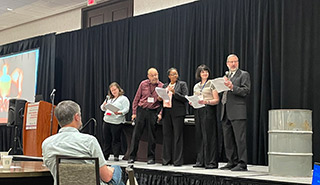
Fitch and colleagues perform a skit to illustrate WTP’s history during the 2023 Trainers’ Exchange in Indianapolis. Pictured from left to right, WTP contractor Allison Weingarten, industrial hygienist Jonathan Rosen, OAI, Inc., principal investigator Krystal Hepburn, Ph.D., Fitch, Mitchel Rosen, Ph.D., principal investigator of the Atlantic Center for Occupational Health and Safety Training. (Photo courtesy of Ashlee Fitch)
As director of the USW TMC, Fitch prioritizes community outreach to recruit the next generation of workers. Recently, she and her colleagues have focused on introducing high school students to careers in the manufacturing sector through short training sessions, site visits, and tours.
Mentorship is also critical to workforce longevity, especially for health and safety professionals, Fitch noted. She speaks from experience. As the youngest principal investigator for a WTP-funded organization, Fitch has learned from colleagues with longstanding experience in the WTP network, including Mitchel Rosen, Ph.D., Jim Frederick, Les Leopold, and many others.
Through their mentorship, Fitch has developed practical skills, like how to direct and manage grants according to institute standards, and interpersonal expertise. In addition, she has cultivated a deep understanding of USW TMC and WTP history.
“People downplay historical knowledge,” she said. “But it is very important to know and understand the past for the sake of the new generation of workers and leaders.”
Ashlee Fitch